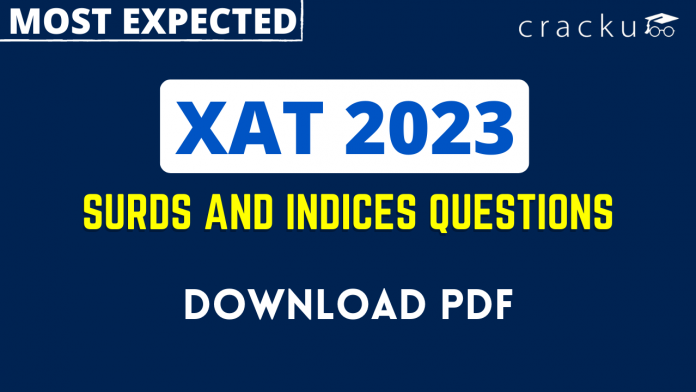XAT Surds and Indices Questions [Download PDF]
Download Surds and Indices Questions for XAT PDF – XAT Surds and Indices questions PDF by Cracku. Practice XAT solved Surds and Indices Questions paper tests, and these are the practice question to have a firm grasp on the Surds and Indices topic in the XAT exam. Top 20 very Important Surds and Indices Questions for XAT based on asked questions in previous exam papers. The XAT question papers contain actual questions asked with answers and solutions.
Download Surds and Indices Questions for XAT
Enroll to XAT 2023 Mocks & Sectionals
Question 1: If x = 1 + $\surd{2}$+ $\surd{3}$, then the value of 2x^{4}- 8x^{3}- 5x^{2} + 26x – 28 is
a) 2$\surd{2}$
b) 3$\surd{3}$
c) 5$\surd{5}$
d) 6 $\surd{6}$
1) Answer (D)
Solution:
x = 1 + $\surd{2}$+ $\surd{3}$
=> $ (x-1)^2 = ( \surd{2}+ \surd{3})^{2} $
=> $ x^2 + 1 -2x = 5 + 2\surd{6} $
=> $ x^2-2x =4 + 2\surd{6} $ ———– (1)
Squaring on both sides
=> $ (x^2-2x)^2 = x^4 + 4x^2 – 4x^3 = 40 + 16\surd{6} $ —— (2)
Now,
$2x^{4}- 8x^{3}- 5x^{2} + 26x – 28 = 2(x^{4}-4x^{3})- 5x^{2} + 26x – 28 $ —- (3)
Substituting values in (1) & (2) in equation (3), we get value as $ 6 \surd {6} $
Question 2: if x+ $\frac{1}{x}$=$\surd{3}$ then the value of $x^{18}+x^{12}+x^{6}+1$
a) 0
b) 1
c) 2
d) 3
2) Answer (A)
Solution:
Given that x+ $\frac{1}{x}$=$\surd{3}$
Squaring on both sides, we get
$(x+ \frac{1}{x})^{3}=(\surd{3})^{3}$
=> $x^{3}+\frac{1}{x^3}+3\surd{3}=3\surd{3}$
=> $x^{3}+\frac{1}{x^3} = 0 $
=> $x^{3}= – \frac{1}{x^3} $
=> $x^{6}= -1 $
Squaring on both sides
=> $x^{12}= 1 $
$ (x^{6})^{3} = (-1)^{3} = -1 $
Therefore,
$x^{18}+x^{12}+x^{6}+1$ = $ -1 + 1 -1 + 1 = 0 $
Question 3: Which of the following statement(s) is/are TRUE?
I. $\surd1+\surd2+\surd3+\surd4+\surd5+\surd6>10$
II. $\surd(10)+\surd(12)+\surd(14)>3\surd(12)$
a) only I
b) only II
c) Niether I nor II
d) Both I and II
3) Answer (A)
Solution:
$\sqrt{1}+\sqrt{2}+\sqrt{3}+\sqrt{4}+\sqrt{\ 5}+\sqrt{6}=10.83.$
it means that (I) is correct.
And, $\sqrt{10}+\sqrt{12}+\sqrt{14}=10.36.$
but, $3\sqrt{12}=10.39.$
So, (II) is not correct .
So, A is correct choice.
Question 4: Which of the following statement(s) is/are TRUE?
I. $\surd(64) + \surd(0.0064) + \surd(0.81) + \surd(0.0081) = 9.07$
II. $\surd(0.010201) + \surd(98.01) + \surd(0.25) = 11.51$
a) Only I
b) Only II
c) Both I and II
d) Neither I nor II
4) Answer (A)
Solution:
$\surd(64)+\surd(0.0064)+\surd(0.81)+\surd(0.0081)=8+0.08+0.9+0.09=9.07\ .$
So, I is correct .
$\surd(0.010201)+\surd(98.01)+\surd(0.25)=10.501\ .$
II is not correct .
A is correct choice.
Question 5: If $(\sqrt{\frac{7}{5}})^{3x-y}=\frac{875}{2401}$ and $(\frac{4a}{b})^{6x-y}=(\frac{2a}{b})^{y-6x}$, for all non-zero real values of a and b, then the value of $x+y$ is
5) Answer: 14
Solution:
$(\sqrt{\frac{7}{5}})^{3x-y}=\frac{875}{2401}$
$\left(\frac{7}{5}\right)^{\frac{\left(3x-y\right)}{2}}=\frac{125}{343}$
$\left(\frac{7}{5}\right)^{\frac{\left(3x-y\right)}{2}}=\left(\frac{7}{5}\right)^{-3}$
3x-y = -6
$(\frac{4a}{b})^{6x-y}=(\frac{2a}{b})^{y-6x}$
Therefor, y=6x as the bases are different so the power should be zero for the results to be equal.
3x-y=-6
or, 3x – 6x = -6
or x= 2
y= 6x = 12
x+y = 14
Question 6: Find the value of $\sqrt{552+\sqrt{552+}\sqrt{552+…}}$
a) 26
b) -24
c) 24
d) -26
6) Answer (C)
Solution:
x = $\sqrt{552+\sqrt{552+}\sqrt{552+…}}$
$x^2-552$ = $\sqrt{552+\sqrt{552+}\sqrt{552+…}}$
$x^2 – x – 552 = 0$
(x-24)(x+23) = 0
x cannot be negative. Therefore, $\sqrt{552+\sqrt{552+}\sqrt{552+…}}$ = 24
Answer is option C.
Question 7: If $x=(4096)^{7+4\sqrt{3}}$, then which of the following equals to 64?
a) $\frac{x^{7}}{x^{2\sqrt{3}}}$
b) $\frac{x^{\frac{7}{2}}}{x^{\frac{4}{\sqrt{3}}}}$
c) $\frac{x^{\frac{7}{2}}}{x^{2{\sqrt{3}}}}$
d) $\frac{x^{7}}{x^{4\sqrt{3}}}$
7) Answer (C)
Solution:
$x=2^{12\left(7+4\sqrt{\ 3}\right)}$.
$x^{\frac{7}{2}}=2^{42\left(7+4\sqrt{\ 3}\right)}$
$x^{2\sqrt{\ 3}}=2^{24\sqrt{\ 3}\left(7+4\sqrt{\ 3}\right)}$
$\frac{x^{\frac{7}{2}}}{x^{2{\sqrt{3}}}}$ = $2^{\left(7+4\sqrt{\ 3}\right)\left(42-24\sqrt{\ 3}\right)}=2^{\left(7+4\sqrt{\ 3}\right)\left(7-4\sqrt{\ 3}\right)6}$ =$2^6$.
Hence C is correct answer.
Question 8: The value is?
$5^{\frac{1}{4}} \times (125)^{0.25}$
a) 5
b) 25
c) 50
d) 10
8) Answer (A)
Solution:
$5^{\frac{1}{4}}$ * $125^{0.25}$
= $5^{0.25}$ * $5^{3*0.25}$
= $5^{0.25+0.75}$
=$5^1$
=5
Question 9: If m and n are integers such that $(\surd2)^{19} 3^4 4^2 9^m 8^n = 3^n 16^m (\sqrt[4]{64})$ then m is
a) -20
b) -24
c) -12
d) -16
9) Answer (C)
Solution:
We have, $(\surd2)^{19} 3^4 4^2 9^m 8^n = 3^n 16^m (\sqrt[4]{64})$
Converting both sides in powers of 2 and 3, we get
$2^{\ \frac{19\ }{2}}3^42^43^{2m}2^{3n}$ = $3^n2^{4m}2^{\frac{\ 6}{4}}$
Comparing the power of 2 we get, $\ \frac{\ 19}{2}+4+3n\ =4m+\frac{\ 6}{4}\ $
=> 4m=3n+12 …..(1)
Comparing the power of 3 we get, $4+2m=n$
Substituting the value of n in (1), we get
4m=3(4+2m)+12
=> m=-12
Question 10: If $R_c = mln \left(1 + \frac{R_m}{m}\right)$ then $R_m$ is equal to
a) $R_m = ln\left(1 + \frac{R_c}{m}\right)$
b) $R_m = ln\left(1 + \frac{R_c}{e}\right)$
c) $R_m = m\left(e^{\frac{R_c}{m}} – 1 \right)$
d) Cannot be determined
10) Answer (C)
Solution:
$R_c = mln \left(1 + \frac{R_m}{m}\right)$
$\ \frac{\ R_c}{m}$ = $ln \left(1 + \frac{R_m}{m}\right)$
$\ \frac{\ R_m}{m}+\ 1\ =\ e^{\ \frac{\ R_c}{m}}$
$\ \frac{\ R_m}{m}\ =\ e^{\ \frac{\ R_c}{m}-1}$
$R_m = m\left(e^{\frac{R_c}{m}} – 1 \right)$
C is the correct answer.





